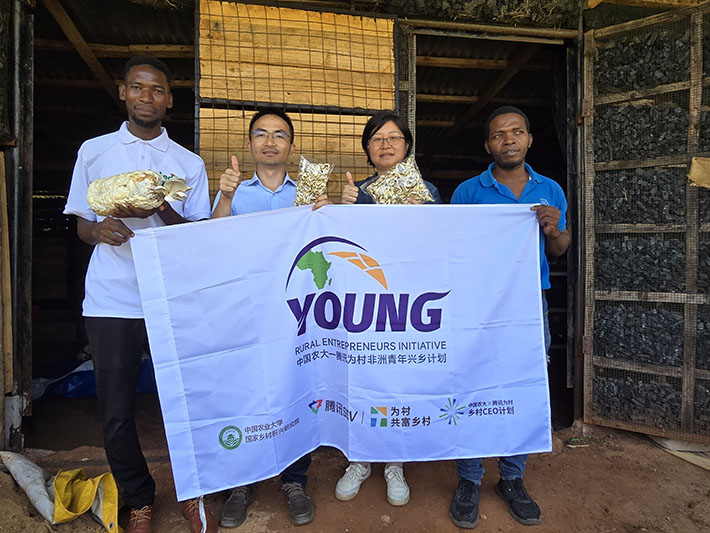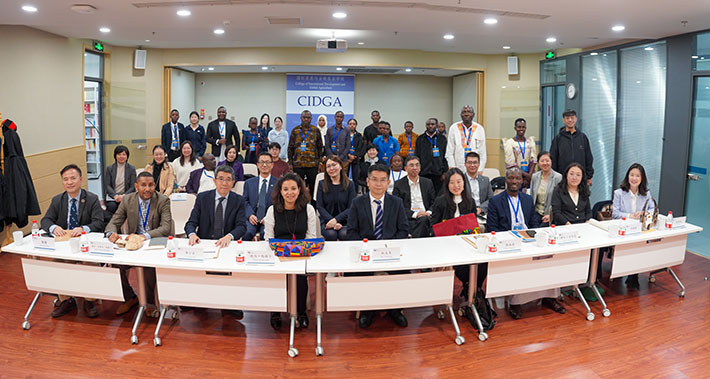|
||||||||||
| Home Top News Economy/Tech Culture/Sports China in Foreign Eyes Green Development Videos Intangible Cultural Heritages |
|
||||||||||
| Home Top News Economy/Tech Culture/Sports China in Foreign Eyes Green Development Videos Intangible Cultural Heritages |
| ChinAfrica |
| Mushrooming Minds |
| China-Africa partnership cultivates a new generation of rural entrepreneurs |
| By Xia Yuanyuan | VOL. 17 June 2025 ·2025-06-05 |

Iden Revocatus Stephano (left) poses for a photo with two professors from CAU (centre) (COURTESY)
Academic exchanges, training, and technology transfer under China-Africa cooperation are heralding a sea change in rural Tanzania.
Iden Revocatus Stephano, based in Morogoro Region, is a shining example of this youth-driven transition. A graduate of Sokoine University of Agriculture, 26-year-old Stephano runs a flourishing mushroom farm - a testament to the growing wave of young Africans reshaping rural economies with global insight and local innovation.
Stephano’s entrepreneurial journey, propelled by Chinese agricultural expertise and initiatives like the CAU-Tencent Africa Young Rural Entrepreneurs Initiative, a programme jointly launched by China Agricultural University (CAU) and Chinese tech giant Tencent, encapsulates a broader trend: African youth are seizing the opportunities presented under China-Africa collaborations to elevate their skills, advance their careers, and spearhead local economic development.
Seeds of ambition
Stephano’s connection with mushrooms began serendipitously, with an unexpected chance to taste them after his high school years. The unique, savoury flavour was a profound culinary awakening, particularly as mushrooms were neither widely cultivated nor common in the local diet at the time. He also met a Chinese national already growing mushrooms in Tanzania. This encounter sparked an idea: mushroom cultivation in Africa represented a “blue ocean” - an industry brimming with untapped potential.
While his parents, like many, had hoped he would secure a stable, possibly government-affiliated, job after university, Stephano envisioned a more independent future. He aspired to pursue a career he was passionate about; one aligned with his academic focus in agricultural economics. The mushroom idea took firm root at university. He proactively immersed himself in relevant cultivation techniques and market knowledge, diligently preparing for an entrepreneurial path.
In 2024, after graduating from university, Stephano put his plan into action. Supported by his university’s entrepreneurship centre and mentors, he gained access to an unused storage shed on campus, which he renovated into a functioning mushroom house. He purchased three jars of mushroom spawn from his original Chinese mentor and threw himself into every aspect of the start-up - from perfecting the cultivation process to managing sales and employing local farmers to help to prepare the nutrient-rich substrate.
“Mushroom farming isn’t as complicated as most people imagine,” Stephano told ChinAfrica. “If you strictly control temperature, humidity, light, and ventilation, it’s quite manageable.”
In the beginning, he struggled due to a lack of funds. For example, he had to improvise with a repurposed oil drum for substrate sterilisation - far from ideal. But he persevered. Today, his mushroom farming yields around 4 kg of fresh mushrooms daily. With strong local demand and scant competition, his produce is consistently in short supply, often earning him profit margins as high as 60 percent.
The power of partnership
Stephano’s entrepreneurial journey, though fuelled by personal determination, was not a solitary one. His selection for the inaugural CAU-Tencent Africa Young Rural Entrepreneurs Initiative in 2024 played a pivotal role in turning his mushroom dream into reality.
Africa, a continent blessed with abundant natural resources, a youthful population, and strategic geographic advantages, holds immense potential in its rural areas. These regions are ideal for producing green, organic, high-quality agricultural products, developing small-scale agro-processing facilities, and promoting rural leisure and tourism. However, realising this potential requires young rural entrepreneurs equipped with technical knowledge and a market-oriented, innovative mindset.
The CAU-Tencent joint initiative, launched in November 2024, addresses this very need. It aims to transform promising young African entrepreneurs into rural leaders capable of advancing local industry, contributing to poverty alleviation, and understanding China’s development trajectory. This vision is pursued through a comprehensive six-month training regimen.
The inaugural cohort included 20 participants from Uganda and Tanzania. The curriculum covered five core modules: developing entrepreneurship awareness, improving marketing and branding skills, applying modern agricultural technologies, drafting business plans, and conducting field study exchanges.
As part of the programme, participants had the opportunity to visit China, where they studied agricultural branding, digital agriculture trends, and rural tourism strategies. They also toured model villages in provinces like Zhejiang and Fujian, regions at the forefront of China’s rural revitalisation efforts.
In 2024, Stephano joined the 19 others on this journey, travelling to Beijing for an intensive two-week training session. The experience expanded his international perspective and equipped him with the theoretical and scientific tools needed to refine and grow his mushroom venture.
Wu Jin, a professor at CAU and a key programme coordinator, remarked, “What African youth truly need is the ignition of their internal motivation for development - not a unidirectional transfer of experience.” She noted that the programme prioritises “localised innovation,” adapting Chinese experiences to African contexts to ensure relevance and long-term success.

Launch of a training session of the CAU Tencent Africa Young Rural Entrepreneurs Initiative in Beijing in November 2024 (COURTESY)
Nurturing leaders
Beyond technical training, the initiative empowers African youth with confidence, networks, and holistic personal development. For Stephano, it inspired the creation of his brand LedG (which stands for “leader generation”), a name reflecting his mission to inspire a generation of rural change-makers.
The programme’s first cohort represented a spectrum of entrepreneurial ambition. Some focused on rice farming to improve food security, while others on cultivating premium watermelons, poultry, or horticultural ventures. Several are establishing value chains in agro-processing and organic fertiliser production.
“Our ultimate goal is to help these young people to believe in themselves, showing them that agriculture, too, is a blue ocean filled with opportunity,” said Tang Lixia, a professor and deputy dean at the College of International Development and Global Agriculture at CAU, also the programme supervisor for Stephano. This philosophy, “teaching people to fish instead of giving them fish,” aims to foster self-reliant talent pipelines and sustainable rural growth across Africa. “Through the programme, I not only learned technical knowledge but, more importantly, also gained innovative ideas concerning rural development and youth entrepreneurship,” Stephano told ChinAfrica.
Through intelligence, resilience and hard work, Stephano and his peers are scripting a new chapter in Sino-African cooperation and rural sustainability. Their “mushroom dreams,” “rice dreams,” and other ventures are merging to build a more prosperous future for Africa’s rural communities. Backed by visionary initiatives like the CAU-Tencent programme, seeds of innovation, empowerment and self-reliance are taking root - poised to yield a rich harvest for generations to come.
| About Us | Contact Us | Advertise with Us | Subscribe |
| Copyright Beijing Review All rights reserved 京ICP备08005356号-5 京公网安备110102005860号 |